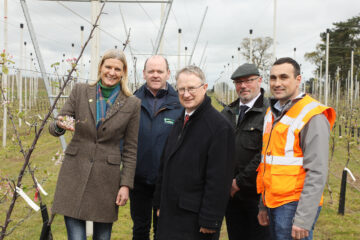There is an understandable sense of frustration among the farming community on climate change issues because the rules are constantly changing. One year they are asked to address an issue, but as soon as they do, the problem changes.
Take, for example, milk quotas introduced in 1984 to address oversupply. This signalled to Irish farmers to switch into suckler beef, which thousands did. In 1985, the suckler herd was 420,000, but by 1998 this had risen to 1.2 million.
But the problem has changed again: it’s no longer too much food, it’s now greenhouse gas emissions.
The UN’s Food and Agriculture Organisation (FAO) estimate that, globally, beef has a carbon footprint over six times greater compared to pork or chicken per kg, and four times higher than milk. Plant proteins have much smaller carbon footprints.
Critically, FAO also find that beef from the specialised beef herds is fourfold less carbon efficient compared to beef produced from dairy herds. It is obvious why this would be the case: in herds that produce both beef and dairy, the carbon output is divided over both products.
Producing beef, incidentally, also requires many times more land and water.
It has become a sacred cow in the national climate debate that Irish agriculture is carbon efficient and that reducing production here would increase emissions globally.
There is some evidence to back this up.
When we consider all inputs on a full life cycle basis, some parts of Irish agriculture are efficient relative to other producers of the same products.
However, according to Bord Bia there is a wide range of carbon efficiencies on Irish beef farms, from 5kg to 25kg CO2 per kg.
We don’t know for sure if this is because some beef comes from the dairy herd, and it would be good to see this analysis done. Yes then, Ireland is efficient, but at producing the most carbon intensive food (beef) in the most carbon intensive manner (a specialised beef herd).
There are, therefore, two distinct narratives on efficiency, and in the post-milk quota era there is a need for an open debate about what is climate-smart.
This means what is best for farming families and farm income first of all, but also what is best for reducing emissions and what is best for building resilience to climate impacts.
There are many options available to farmers that would provide better answers to these questions compared to current land use choices. Dairy-beef systems, on-farm renewables, forestry and energy crops all spring to mind.
We simply do not know if reducing production here would increase emissions globally.
It depends on how efficient the Irish producers in question are, if there is a price effect from reducing production, if there is substitution effect in the market place to different products, and if not, who takes up the slack (a Brazilian or an Austrian producer)?
Until we know the answers to these questions, people may rightly wonder: is the sacred cow more bull?
Joseph Curtin is a research fellow at the Institute of International and European Affairs. Any opinions expressed are the author’s own.
CLIMATE CHANGE: THE VIEW FROM THE PLOUGHING
Martin Downey, Dromore, Co Down
“I can see the problems they’re having all over the country with flooding. It’s hard to describe the whole thing, but it takes a while to heal and it takes a long time to get over it. You can see the problems with big rivers and having to clean them out. I think it is related to climate change.
“The ground needs to be drained and we need to reseed more regularly. More planting would help, definitely.”
Liam Dwyer, dairy farmer, Swords, Co Dublin
“I suppose I would be concerned about it, yes. This whole thing of food going all over the world when it could be produced and consumed locally, instead of shipping stuff all over the world. All that needs oil to move it and that creates more climate change. We’re lucky we don’t have any flooding, but that is climate change too.
“Eating locally would help. But I suppose you have to weigh it up against the economy. Everyone has to make a living too.”
Kathleen Henry, Screen, Co Sligo
“I would be very concerned, particularly since I had a baby. We have a lot (of flooding) near us because rivers are bursting, and you don’t want to see people’s houses flooded and their land saturated. People are already having to bring their cattle in which means they’re taking in their silage. That’s expensive. Some were trying to get their second cut of silage only recently because they couldn’t get it all summer. You could see fields with puddles.
“Farmers are doing their best for the environment because we want to hand on the farms to our children. We can protect the way we look after drains and habitats, but industry needs to do their bit too – cow emissions are balanced off by open areas and forestry. But the bigger factories don’t really offset.”
Ger Haydn, Mountmellick, Co Laois
“I have my own opinion on climate change, I don’t think it really exists. Going back millions of years ago, Ireland is supposed to have been covered in ice. What melted it back then?
“In my lifetime, I’d put down 2009 and 2010 as two of the worst winters going. I always heard my father talking about 1946 and 1947. My grandfather was a gardener and in 1947, he had loganberries blossoming in December. I have the clip of the paper at home. Nowadays they’d put that down to climate change.
“But there’s a lot of pollution. Healthwise, this isn’t good for us. There is an issue with a lot of sprays – people should educate themselves more on what they’re using. If it takes so much to do an acre, don’t be putting in enough to do an acre and a half. Maybe that’s what’s doing harm.”
Niall Collins, Croom, Co Limerick
“I’m not really concerned with it – it’s hard to worry about it when you’re farming. But it does exist alright. Flooding is part of it, I suppose.
“Less fertiliser spreading might help a bit for climate change. Planting trees and a more natural way of farming would be helpful too.”
Sheila Woodcock, Cuffesgrange, Co Wexford
“I am concerned about climate change. Not just for farming but for all of us, for life in general. It is affecting the way we’re going to farm with extremes of rain and wind. Flooding and extreme high winds in clear fell cause wipe-outs, destroying the whole crop. That’s another area.
“Erosion is going to be a huge problem. We’re losing our tracks and trails on our hillwalks. Tackling it is going to be a knee-jerk problem because old-habits die hard. Planting trees might help, but it’s a catch 22. Planting is not a tradition in Ireland, people don’t like to plant good land. Burning fossil fuels has to be eradicated. It’s affecting farmers full-time, but it’s not just for the farmers to solve. It’s for everyone.”



